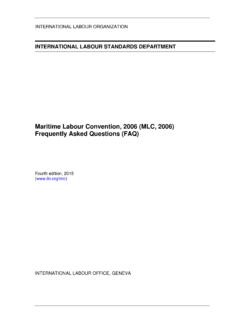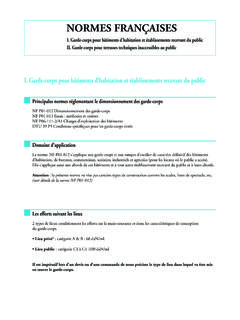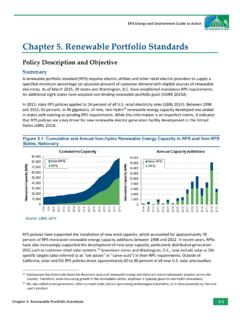Transcription of Employment Standards Frequently Asked Questions …
1 Employment Standards Frequently Asked Questions september 2013. This Frequently Asked Questions document has been prepared to provide information to employers and employees about the Employment Standards Act and Regulations. 1. Introduction to the Employment Standards Act 2. General Information Overview Definitions and Terms 3. General Exemption Regulation 4. Hours of Work and Overtime 5. Minimum Wage & Minimum Wage Regulation 6. Vacation and Vacation Pay 7. General Holidays 8. Termination of Employment 9. Recordkeeping 10. Payment of Wages Pay periods Method of payment Deductions from wages Reduction of wages 11. Complaints 12. Fair Wage Schedule 13. Maternity and Parental Leave 14. Equal Pay 15. Special Leave without Pay Sick Leave Bereavement Leave Compassionate Care Leave Reservist Leave Critically-ill Child Leave Disappearance or Death of a Child Leave 16.
2 Employment Standards Board Employment Standards Frequently Asked Questions september 2013. No. 1 INTRODUCTION TO THE Employment Standards ACT. 1. WHAT IS THE Employment Standards ACT? The Employment Standards Act sets the minimum Standards for Employment in Yukon. It sets out such things as minimum wage, hours of work, vacation pay, notice provisions and special leave. 2. WHO DOES THE ACT APPLY TO? The act applies to all employers and employees in Yukon, with some exceptions. Employees of the territorial and federal governments are exempt. Employees working in inter-provincial undertakings, , trucking companies, banks, airports and the postal service are covered by federal legislation administered by Labour Canada. As well, some employees are exempted from the Employment Standards Act by regulation.
3 An Employment Standards Officer should be consulted if employers or employees are unsure whether they are covered by the act. 3. HOW ARE THE PROVISIONS OF THE ACT ENFORCED? Employment Standards Officers are responsible for the interpretation and administration of the act. A variety of methods are used by the officers to ensure that employers and employees are in compliance with the law. Some methods are public education programs, payroll audits, complaint investigation, mediation, conciliation and, as a last resort, prosecution. The officers are granted a number of powers under the act to assist them in their duties. 4. WHAT CAN AN EMPLOYEE DO IF AN EMPLOYER VIOLATES THE ACT? The employee can file a complaint with Employment Standards where an Employment Standards Officer will investigate and attempt to resolve the complaint in accordance with the act.
4 5. WHERE CAN AN EMPLOYEE FILE A COMPLAINT IF THE EMPLOYEE IS NOT COVERED. BY THE ACT? If it is determined that the employee is not covered by the act or that the complaint is beyond Employment Standards ' jurisdiction, the officer may direct the complainant to an appropriate agency, such as: Labour Canada; Service Canada; Canada Revenue Agency; Public Service Alliance of Canada; Small Claims Court; the Human Rights Commission; and other provinces or territories. 6. WHAT TYPES OF COMPLAINTS CAN BE FILED? Complaints are of two types: Monetary - The majority of complaints are claims for unpaid wages, arising from violations of the provisions governing hours of work, overtime payment, vacation pay, minimum wages, unauthorized deductions, and notice of termination.
5 Non-monetary - Complaints arise from violations of the leave provisions. Contravention of the act for any reason may result in prosecution, but best results are achieved through education and compliance, not in court action. Employment Standards Frequently Asked Questions september 2013. 7. CAN THE EMPLOYER AND EMPLOYEE MAKE AN AGREEMENT THAT IS NOT. ADDRESSED BY THE ACT? Employers and employees can agree to more favourable conditions than the act provides. An agreement for less favourable conditions, no matter the reasons underlying the arrangement, is not a valid agreement. 8. CAN AN EMPLOYEE TRY TO CLAIM MORE THAN THE MINIMUM Standards ? The employee is entitled to receive wages and benefits established by the terms of Employment . Therefore, if the employer and employee have agreed to more favourable conditions than the minimum Standards , the employee is entitled to file a claim based on that agreement.
6 The employee should be prepared to provide Employment Standards with documentation that supports their claim such as wage statements, an Employment contract, and other work-related records. * The content of this Employment Standards FAQ is for information purposes only. For a complete interpretation and application details please refer to the Employment Standards Act and Regulations or contact an Employment Standards Officer at (867) 667-5944 (toll free within Yukon 1-800-661-0408 extension 5944). Employment Standards Frequently Asked Questions september 2013. No. 2 GENERAL INFORMATION. 1. Employment Standards . Employment Standards Officers deal with problems arising from the employer-employee relationship. Employers and employees are urged to contact an Employment Standards Officer for information on all matters arising from the Employment Standards Act and its Regulations.
7 2. DEFINITIONS. The following definitions will assist you in understanding the terms affecting the employer- employee relationship: "conditions of Employment means all matters and circumstances in any way affecting employers and employees in respect of the Employment relationship;. "day" means any period of 24 consecutive hours after the commencement of work;. contract worker means a worker, whether or not employed under a contract of Employment , and whether or not furnishing tools, vehicles, equipment, machinery, material, or any other thing owned by the worker, who performs work or services for another person for compensation or reward on such terms and conditions that: (a) the worker is in a position of economic dependence upon and under an obligation to perform duties for, that person, and (b) the relationship between the worker and that person more closely resembles the relationship of employee to employer than the relationship of an independent contractor to a principal or of one independent contractor to another independent contractor.
8 "employee includes: a) a person, including a deceased person, in receipt of or entitled to wages for Employment or services performed for another;. b) a person being trained by an employer for the purpose of the employer's business;. c) a contract worker; and d) a person who was an employee. "employer" means a person having control or direction of, or responsibility for the Employment of, or payment of wages to, an employee and includes a former employer;. "overtime" means hours of work in excess of the standard hours of work;. "standard hours of work" means the hours of work described in Section 6 (8 hours in a day and 40 hours in a week);. "wages" means any monetary remuneration payable by an employer to an employee under the terms of a contract of Employment , any payment to be made by an employer to an employee under this Act, and any allowance for travel as prescribed in the Regulations, but does not include gratuities, money that is paid at the discretion of the employer and that is not related to hours of work, production or efficiency, damages awarded in a wrongful dismissal action, travelling expenses, or other expenses.
9 "week" means a period of seven consecutive days established by the employer's payroll records or determined by an Employment Standards Officer. Employment Standards Frequently Asked Questions september 2013. 3. RECORD-KEEPING. Employers must keep a record of the employee's name and address, the number of hours worked by the employee in each day and each week, the employee's wages, gross earnings, and deductions, the overtime accumulated by the employee each week, the time off with pay instead of overtime pay accumulated and taken by the employee each week, the vacations taken by the employee, the leaves of absence taken by the employee, and the conditions of Employment for each employee regardless of the method of payment. The records must be kept in the employer's principle place of business in Yukon for a period of twelve (12) months after work is performed or services are supplied by an employee.
10 4. MINIMUM Standards . The minimum Standards provided in the act cannot be waived by any agreement between an employer and employee, but an agreement allowing for more favourable conditions is valid. For example, the parties can agree that any work after 8 hours per day will be paid at double time but they cannot agree that any work after 8 hours per day will be paid at straight time. 5. DEDUCTIONS FROM WAGES. An employer is not allowed to make any deductions, other than statutory deductions, from an employee's wages. However, an employer can honour an employee's written authorization to pay wages to a charitable or other organization, a pension or superannuation plan, an insurer licensed under the Insurance Act, to meet credit obligations and for a purpose that the Director of Employment Standards considers is for the benefit of the employee.





